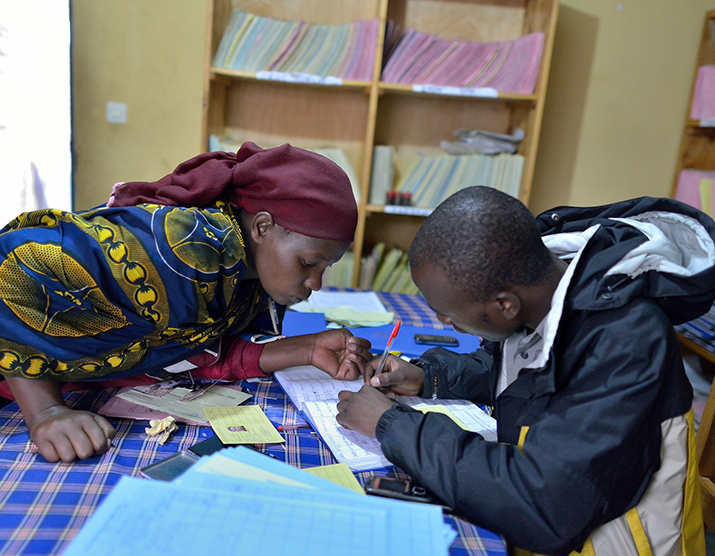Removing Financial Hardship to Increase Access to and Promote Preventive Health Services
Removing Financial Hardship to Increase Access to and Promote Preventive Health Services

Raissa Iradukunda and her two children live near Remera-Rukoma District Hospital, about one hour from Kigali, Rwanda. The family is covered under Rwanda’s community-based health insurance (CBHI) program, known locally as Mutuelle de Santé. “We are farmers,” she explains, “but we can afford to pay the required 3,000 Rwf [USD 3.45] per year because we know that Mutuelle de Santé has enabled us to access health care even in situations where we did not have enough money for some services.”
CBHI improves people’s access to services by removing the financial hardship of medical costs. It also promotes a culture of prevention by encouraging people to access preventive health services at no cost. For example, early and frequent antenatal visits help health workers identify potential issues with pregnancy and counsel women to deliver in facilities with the appropriate level of care, which reduces the likelihood of costly emergency services and the risk of adverse outcomes for the mother and baby. CBHI is coordinated at the district level, and each of Rwanda’s 30 districts has a pooled-risk fund. Membership fees are collected at the community level, and the community reimburses health centers for services rendered.
Membership premiums are based on income. At the Government of Rwanda’s request, USAID designed a database to classify more than nine million Rwandan households into six categories, based on income and assets, to stratify CBHI payments according to need and increase equity in accessing services, particularly among the poorest Rwandans
As 71% of the Rwandan population has access to CBHI, the country’s gap in health service coverage between rich and poor for all pregnancy, birth, and newborn-related services is low, and Rwanda is performing better than its neighbors in the Central and East African regions.
For 10 years, USAID has provided substantial financial and technical support to the Government to maintain the CBHI system. Having built this capacity, only targeted technical assistance on complex or novel issues is now provided, as the Rwanda Social Security Board (RSSB) effectively oversees ongoing management, such as raising awareness among other government institutions on the financing gap so it can be filled. The RSSB manages the CBHI fund and ensures registration of and disbursement to beneficiaries.
When the management of CBHI transitioned from the Ministry of Health to the RSSB in July 2015, members like Raissa feared their families would not receive the same health benefits. If enrollment rates decreased because of this fear, CBHI would no longer be sustainable. The USAID-funded Rwanda Health Systems Strengthening (RHSS) Project, among other actions, launched a high-profile, celebrity-powered awareness campaign to promote CBHI re-enrollment, emphasizing the importance of preventive health care and continued financial protection from unexpected health care costs. As a result, there was a 7% increase in enrollment, from 76.3% in 2014/15 to 84.6% in 2017/18, which shows that the RSSB is effectively managing the insurance scheme and meeting the populations’ expectations.
By encouraging access to primary and preventive care, CBHI is helping Rwandans stay healthy and preventing significant future health expenses for both the population and the Government. The average number of times a person visits a health facility for outpatient care has steadily increased, from 0.79 times per year in 2012 to 1.36 times in 2018. Combined with the expanding coverage of CBHI, this suggests that barriers to accessing care in Rwanda are decreasing.
CBHI helps improve equity in the health system by enabling people with diverse incomes to access care without fear of financial hardship. This is a major step toward financial protection along the journey to self-reliance.